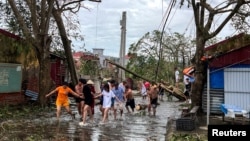Typhoon Yagi caused $1.6 billion in economic losses in Vietnam, state media said Monday, as the UN's World Food Program said the deadly floods it triggered in Myanmar were the worst in the country's recent history.
Yagi battered Myanmar, Vietnam, Laos and Thailand with powerful winds and a huge dump of rain more than a week ago, triggering floods and landslides that have killed more than 400 people, according to official figures.
It tore across Vietnam's densely populated Red River delta — a vital agricultural region that is also home to major manufacturing hubs — damaging factories and infrastructure, and inundating farmland.
The typhoon caused an estimated $1.6 billion in economic losses, state media reported, citing an initial government assessment.
The death toll in Vietnam stands at 292, with 38 missing, more than 230,000 homes damaged and 280,000 hectares of crops destroyed, according to authorities.
In Myanmar, the ruling junta has reported 113 fatalities and said that more than 320,000 people have been forced from their homes into temporary relief camps.
"Super Typhoon Yagi has affected most of the country and caused the worst floods we have seen in Myanmar's recent history," Sheela Matthew, WFP's representative in Myanmar, said in a statement, without giving precise details.
Exact details of the impact on agriculture were not yet clear, she said.
"But I can say for sure that the impact on food security will be nothing less than devastating," Matthew said.
Severe flooding hit Myanmar in 2011 and 2015, with more than 100 deaths reported on both occasions, while in 2008 Cyclone Nargis left more than 138,000 people dead or missing.
The latest crisis has prompted the junta to issue a rare appeal for foreign aid, with neighbor India responding with 10 tons of materials, including dry rations, clothing and medicine.
Myanmar's military has blocked or frustrated humanitarian assistance from abroad in the past, including after powerful Cyclone Mocha last year when it suspended travel authorizations for aid groups trying to reach around a million people.
Even before the latest floods, people in Myanmar were already grappling with the effects of three years of war between the junta and armed groups opposed to its rule, with millions forced from their homes by the conflict.







